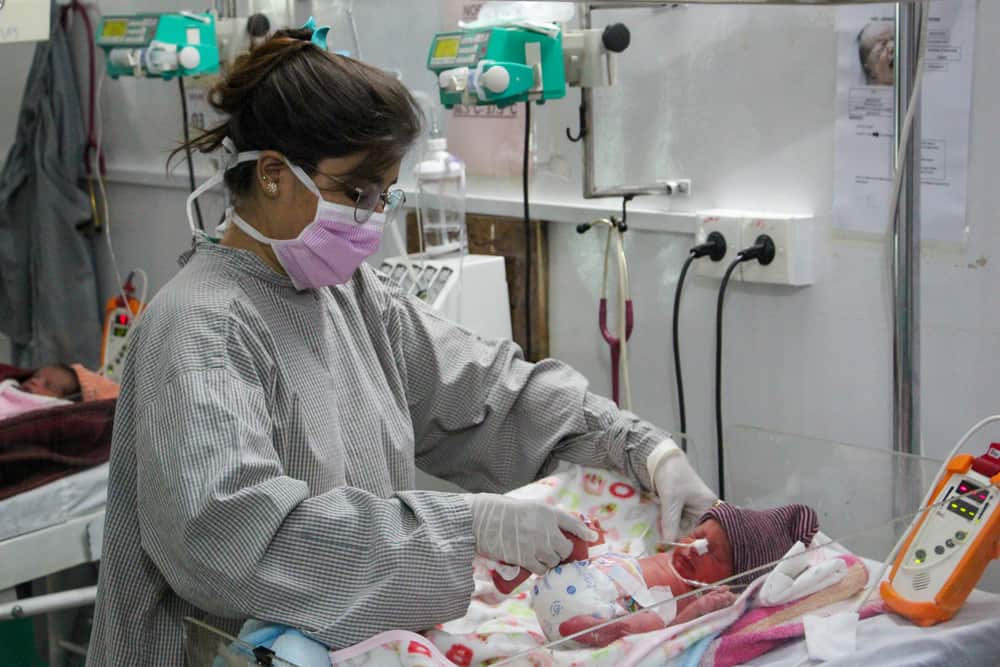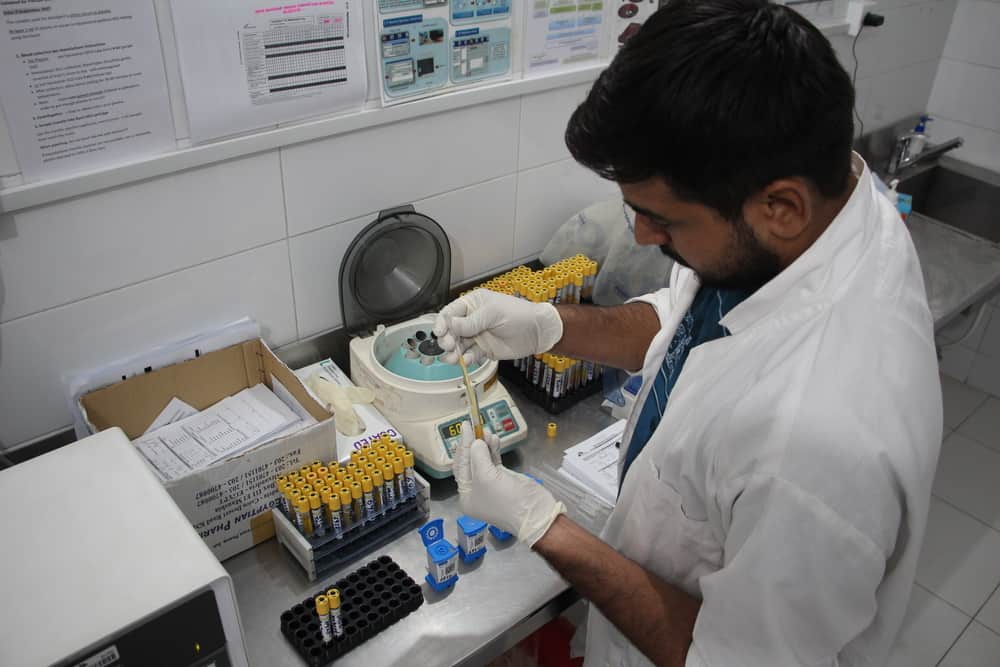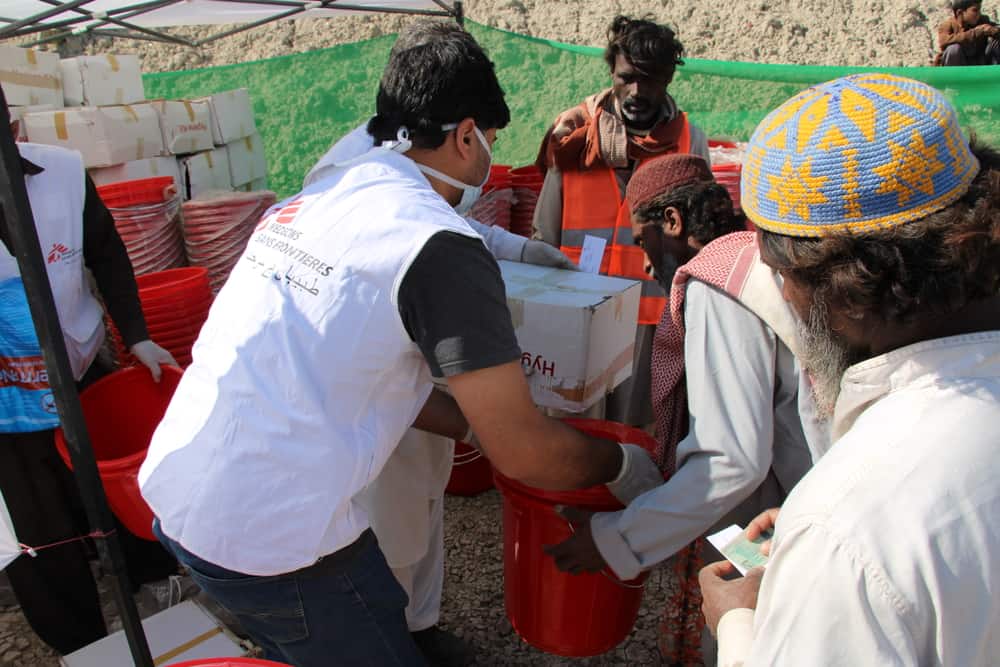What we do
Healthcare for women, children and newborns is a serious concern in Pakistan and remains our priority there. Women in rural areas die from preventable complications during pregnancy and delivery, and neonatal care is unavailable in many areas. According to the 2017-8 Pakistan Demographic and Health Survey, 1 in every 14 children dies before the age of five.
- Pakistan
Access to healthcare remains a challenge in Pakistan, especially for people in rural communities, informal settlements and areas affected by conflict.
Why are we here?

Healthcare for women, children and newborns
The availability of free, high-quality medical care is limited for women and children, particularly in rural areas. We work in four different locations in Balochistan and Khyber Pakhtunkhwa provinces to provide reproductive, neonatal and paediatric care. Local communities, Afghan refugees and people who cross the border from Afghanistan to seek medical assistance benefit from our comprehensive 24-hour emergency obstetric services, which include surgery and referrals for complicated cases. We also run inpatient and outpatient therapeutic feeding programmes for severely malnourished children in Balochistan.

Endemic Diseases
Cutaneous leishmaniasis, a disease transmitted by the bite of a sandfly, is endemic in parts of Pakistan. The disease is characterised by disfiguring and painful lesions. We run five treatment centres for this disease; three in Quetta, Balochistan, one in Bannu and one in Peshawar Khyber Pakhtunkhwa. Our teams offer diagnosis, treatment, health education and counselling. Globally, Pakistan is one of the countries with the highest number of hepatitis C cases. MSF has been running a clinic for Hepatitis C virus in Machar Colony, a densely populated informal settlement in Karachi. In 2023 alone MSF started 1, 942 people on antiviral treatment specifically designed for hepatitis C virus. Pakistan also ranks fifth among the high tuberculosis (TB) burden countries, and sixth when it comes to drug-resistant tuberculosis (DRTB). Since 2021, MSF has been working in close collaboration with Punjab health authorities to offer free diagnosis and treatment services to DRTB patients at the programmatic management of DRTB site (PMDT) in Gujranwala district.

Emergency Response
MSF supports the Pakistani authorities with emergency response preparedness in case of disease outbreaks or natural disasters. When Pakistan was hit by catastrophic flooding in mid-2022, MSF launched emergency activities to assist the millions of people affected by it. We reoriented our existing programmes and expanded our activities to respond to the emergency in the worst hit areas in Balochistan, Khyber Pakhtunkhuwa and Sindh provinces providing healthcare and addressing specifically severe acute malnutrition, alongside ongoing the malaria outbreak with treatment and prevention. Our emergency activities continued in 2023 as well.
In 2023
In Pakistan, Médecins Sans Frontières (MSF) continued to deliver medical care to people affected by the devastating floods in 2022, and to run projects to tackle neglected and communicable diseases.
Our teams provided healthcare, including treatment for malnutrition, malaria and cutaneous leishmaniasis, to flood-hit communities in Dadu district, Sindh, until November, when we transferred activities to the health authorities.
In north Sindh and east Balochistan, we ran mobile clinics, offering healthcare to children and pregnant and lactating women until June. As well as treatment for malaria and malnutrition, we improved water and sanitation provision and distributed therapeutic food and mosquito nets. Throughout the year, we also offered reproductive, neonatal and paediatric care at three locations in Balochistan, serving local communities and Afghan refugees. Activities included emergency obstetric services, nutrition programmes and patient referrals. Our cutaneous leishmaniasis programme registered a sharp increase in patient numbers across all five of our clinics in Balochistan and Khyber Pakhtunkhwa provinces in 2023. In addition to diagnosis, care and mental health support, we are conducting clinical research into better treatment options.
In Khyber Pakhtunkhwa, we also provide general healthcare consultations in Tirah Valley, Khyber district, for locals and people who have resettled there. In Karachi, Sindh, MSF’s one-year intervention in Baldia rural health centre ended in July. Its aim was to introduce a model of care for hepatitis C that could be implemented at general healthcare level. The centre has since been made a ‘sentinel site’ for hepatitis C.Meanwhile, we strengthened our screening for the disease in Machar Colony, and continued to offer diagnosis and treatment to the mostly undocumented residents through our clinic there. In Gujranwala, Punjab, we focus on providing diagnosis and treatment for drug-resistant tuberculosis.
In 2023, we started implementing shorter treatment regimens, and reinforced our patient-centred approach by setting up support groups and conducting home visits and follow-up consultations.
OUR ACTIVITIES IN 2023
-
Related:
- Pakistan











